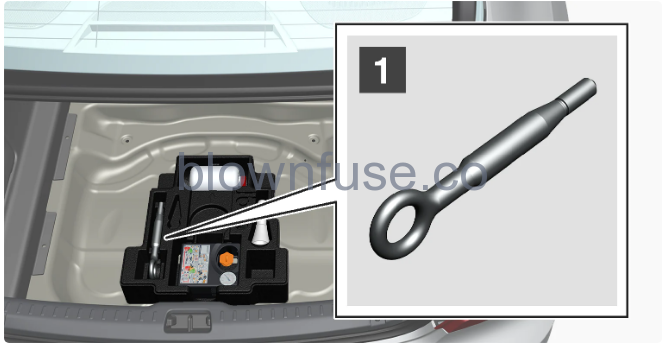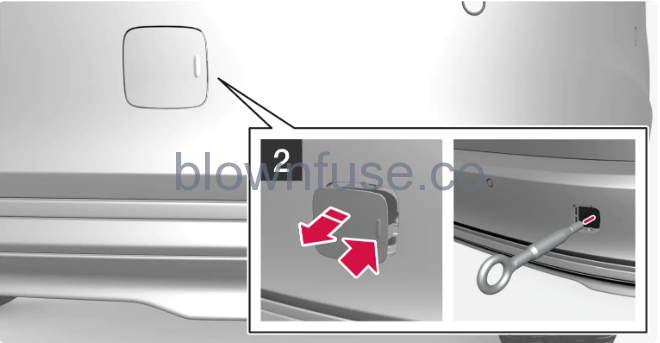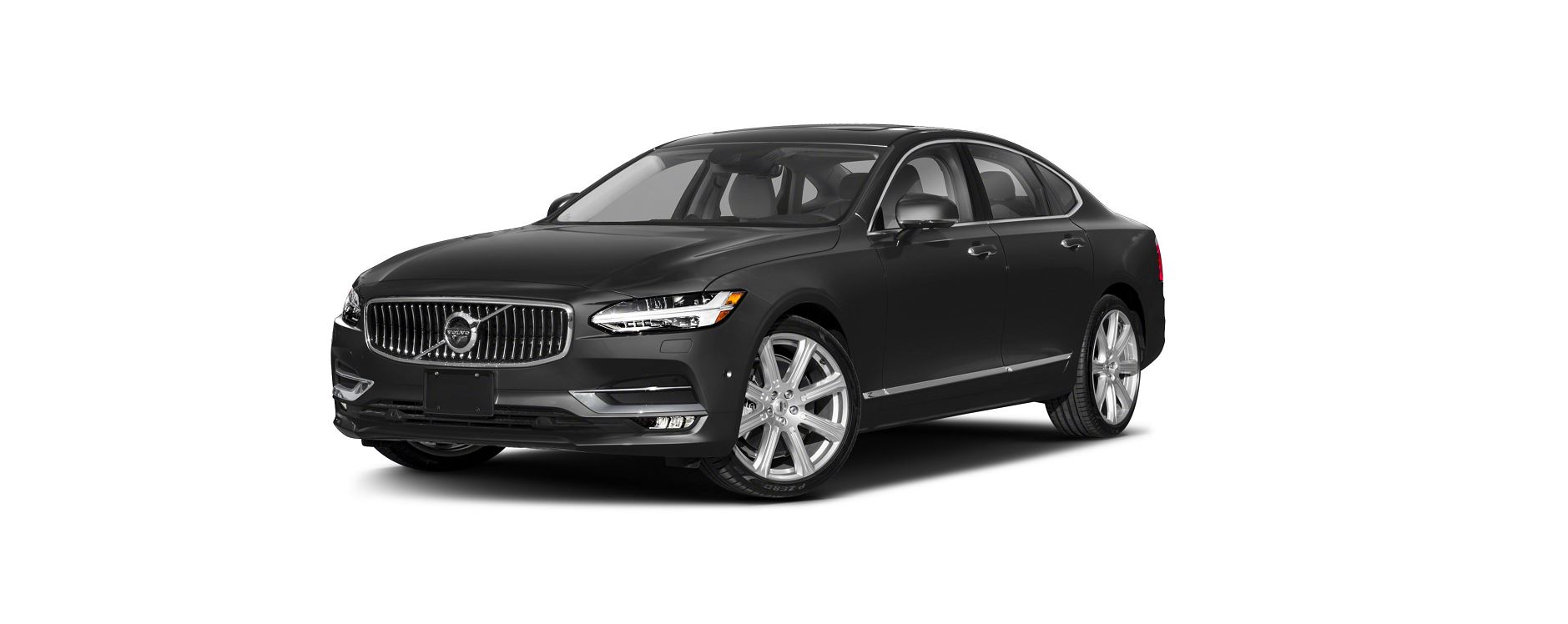2023 Volvo S90/ S90 Recharge Plug-in Hybrid Towing and recovery

Towing
During towing, the car is towed by another vehicle by means of a towline.
Important
Towing the car is not permitted as the electric motor may be damaged. Instead, the car must be transported raised with all the wheels on a recovery vehicle’s platform. Neither of the wheel pairs may have contact with the road.
Towing the car is not permitted as the electric motor may be damaged. Instead, the car must be transported raised with all the wheels on a recovery vehicle’s platform. Neither of the wheel pairs may have contact with the road.
When towing another car
- Towing a car requires a lot of energy – use the Constant AWD drive mode. The hybrid battery is then charged and the car’s driving and road characteristics are improved.
- Find out the statutory maximum speed limit for towing before the towing begins.
Jump starting
Tow-starting the motor is not permitted as this will damage the electric motor. Use a donor battery if the starter battery is discharged and the engine does not start.
Important
The electric drive motor and the catalytic converter may be damaged during attempts to tow-start the car.
The electric drive motor and the catalytic converter may be damaged during attempts to tow-start the car.
Fitting and removing the towing eye
Use the towing eye if the car shall tow another vehicle. The towing eye is screwed into a threaded socket behind a cover on the right-hand side of the rear bumper.
Note
If the car is equipped with a towbar, there is no rear mounting for a towing eye.
If the car is equipped with a towbar, there is no rear mounting for a towing eye.
Fitting the towing eye

Take out the towing eye from the foam block under the floor in the cargo area.
- Remove the cover – press on the marking with a finger while you fold out the opposite side/corner.
- The cover pivots around its centre line and can then be removed.
- Screw in the towing eye until it reaches its end stop.
- Screw the eye in firmly. For example, thread through the wheel bolt wrench and use it as a lever.
Important
It is important that the towing eye is firmly screwed into place – right in until it stops.
It is important that the towing eye is firmly screwed into place – right in until it stops.
Removing the towing eye
- Unscrew and remove the towing eye after use and return it to its foam block.
- Finish by refitting the cover onto the bumper.
Recovery
- For recovery, the car is taken away with the help of another vehicle.
- Call a recovery service for recovery assistance.
- The towing eye can be used to pull the car up onto a recovery vehicle with a flatbed platform.
Important
- Note that the car must always be transported raised up with all the wheels on the recovery vehicle’s platform.
- If the car is equipped with air suspension, this must be disabled before the car is raised. Deactivating the function via the centre display.
- Press
 .
. - Select Driving.
- Select to activate or deactivate air suspension.
The car’s position and ground clearance determine whether it is possible to pull it up onto a flatbed platform. If the slope of the recovery vehicle’s ramp is too steep, or if the ground clearance under the car is inadequate, then the car may be damaged if you try to pull it up. The car should then be lifted using the recovery vehicle’s lifting device.
Warning
No one/nothing is allowed to remain behind the recovery vehicle while the car pulled up onto the flatbed platform.
No one/nothing is allowed to remain behind the recovery vehicle while the car pulled up onto the flatbed platform.
Safety mode
Safety mode is a protective state that is triggered when a collision may have damaged any of the car’s vital functions, such as the fuel lines, sensors for any of the safety systems, or the brake system.If the car has been in a collision, the message Safety mode See Owner’s manual may be shown on the driver display with a warning symbol as long as the display is not damaged and the car’s electrical system is still in working order. This message means that the car has reduced functionality.
Warning
- Never, under any circumstances, attempt to restart the car if it smells of fuel when the Safety mode See Owner’s manual message is shown in the driver display.
- Leave the car at once.If the car is in safety mode, it is possible to attempt to reset the system in order to start and move the car for a short distance, if in a dangerous traffic situation for example.
- Never attempt to repair your car or reset the electronics yourself if the car has been in safety mode. This could result in personal injury or the car not functioning as normal. Volvo recommends engaging an authorised Volvo workshop to check and restore the car to normal status after Safety mode See Owner’s manual has been shown.
- If the car is in safety mode it must not be towed. It must be transported from its location. Volvo recommends that it is transported to an authorised Volvo workshop.
Starting and moving the car after safety mode
If the car is in safety mode, it is possible to attempt to reset the system in order to start and move the car for a short distance, if in a dangerous traffic situation for example.
Reset and start the car after safety mode
- Check the general damage situation of the car and whether any fuel has been leaking. There must be no smell of fuel either.
- If there is only minor damage and a check has revealed no fuel leaks, starting can be attempted.
Warning
- Never, under any circumstances, attempt to restart the car if it smells of fuel when the Safety mode See Owner’s manual message is shown in the driver display. Leave the car at once.
- Switch off the car manually.
- Then try to start the car.
- The car’s electronics carry out a systems check and then try to resume normal status. The driver display shows the message Car start System check, wait during this time. This can take up to one minute.
- Then try to start the car again when the message Car start System check, wait is no longer shown in the driver’s display.
Important
If the message Safety mode See Owner’s manual is still shown on the display the car must not be driven or towed but a vehicle recovery service must then be used instead. Even if the car appears to be driveable, hidden damage may make the car impossible to control once moving.
If the message Safety mode See Owner’s manual is still shown on the display the car must not be driven or towed but a vehicle recovery service must then be used instead. Even if the car appears to be driveable, hidden damage may make the car impossible to control once moving.
Moving the car after safety mode
- If the driver display shows the message The car is now in normal mode after a start attempt, the car can be carefully moved if standing in a dangerous position.
- Do not move the car further than necessary.
Warning
If the car is in safety mode it must not be towed. It must be transported from its location. Volvo recommends that it is transported to an authorised Volvo workshop.
If the car is in safety mode it must not be towed. It must be transported from its location. Volvo recommends that it is transported to an authorised Volvo workshop.

